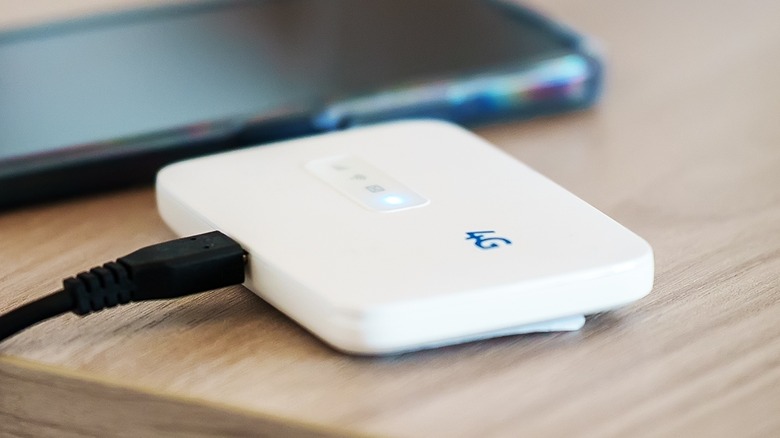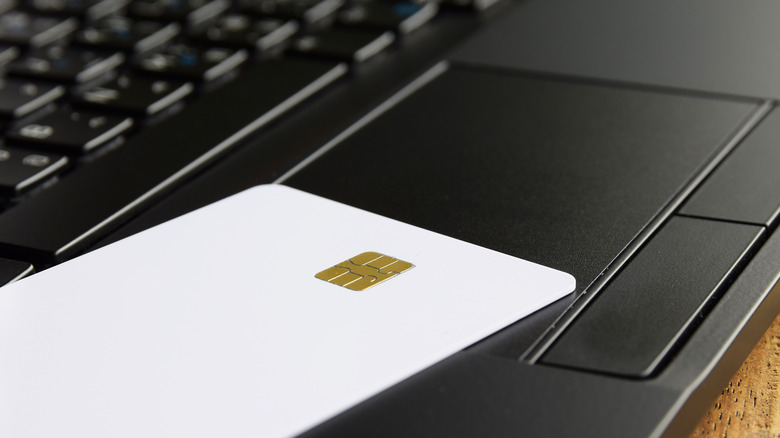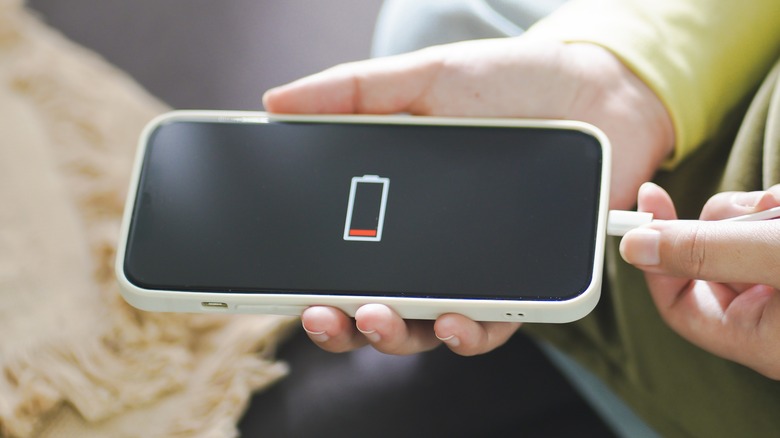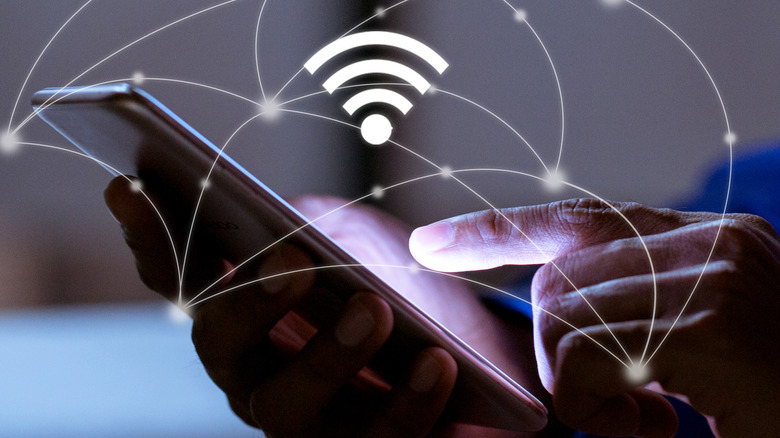Here's Why You Might Want To Buy A Portable Hotspot If You Travel Often
We may receive a commission on purchases made from links.
Modern life revolves around the internet, and that's why mobile broadband is so popular. If you have a smartphone, the odds are you already have a data plan and the ability to share it with your other wireless gadgets using a phone feature called the hotspot. The built-in hotspot functionality is a great way to access the internet while traveling, but it does come with some limitations.
As an alternative to your phone's hotspot, you can buy a portable router like the Netgear Nighthawk 4G LTE, which some people simply refer to as a portable hotspot. These typically tiny devices are small enough to fit in a pocket and they work by connecting to a cellular network in the same way as a smartphone, but only for the purpose of broadcasting the connection as a Wi-Fi network for nearby devices. If you're often traveling for work or pleasure, you can use your smartphone as a hotspot, but there are some good reasons to buy a dedicated hotspot device instead.
Your laptop and tablet may lack built-in SIM support
It's not uncommon for tablets and even many laptops (typically of the ultrabook variety) to come with built-in cellular connectivity ... for a price, at least. If you're willing to pay more for a cellular model, you'll be able to pop a SIM card directly into the device (or utilize an eSIM) to take your internet access point with you everywhere you go. If, however, your device lacks built-in cellular connectivity, you'll be forced to either use public networks while traveling or you'll have to rely on your phone's hotspot feature.
There are two potential problems with those latter options, though: the phone's service plan may not allow hotspot access and public networks may be insecure, making it risky to log into work accounts without something like a VPN. You can typically upgrade to a phone plan that includes hotspot support, but that plan may prove more expensive than purchasing a dedicated data line for use with a portable hotspot, as many carriers limit hotspot access to pricey unlimited plans.
Many wireless service providers now offer data-only SIM cards, some with unlimited monthly data and others that involve prepaying for a certain block of data that'll remain available for up to a year. For example, you can buy a SIM card with a data-only plan and prepay for 25 GB of data; you'll only need to pay again once you've used up all of the data, which may be ideal if you don't typically download content or stream videos. A data-only SIM can be popped into any compatible portable router.
You need to avoid draining your phone's battery
If you don't have access to an outlet at all times while traveling, using the hotspot on your phone will result in running down its battery faster, and that could be a big problem when you suddenly need to take or receive a call — not to mention, it could be a safety issue in some cases if you find yourself with a dead battery while in a different city or country. Dedicated portable hotspots have built-in batteries that allow them to run on their own even if they're not plugged in, and while having the router's battery die mid-work may be annoying, it won't leave you without a way to contact help if needed.
As well, many portable routers are built with simple designs that include user-removable batteries, unlike modern smartphones that typically have sealed back panels. If you get a portable hotspot that has a removable battery cover, you can buy a backup battery or two, charge them, and then keep them in your bag. If the hotspot's battery runs out of juice before you can get back to your hotel room, you can simply swap out the dead battery with the charged backup battery and get back online in minutes.
You won't be dependent on a single device
Using your smartphone as a mobile internet hotspot makes sense right up until the moment you accidentally break or otherwise lose access to the handset. It's easy to break the screen on a phone, for example, after which point you may be unable to turn the mobile hotspot feature on. The loss of your phone will also mean the loss of your ability to access the internet independent of other people's networks, and you'll be forced to use whatever public Wi-Fi connection may be available.
That's not too terrible in some situations — for example, if you're staying in a hotel that has its own free high-speed internet offering. However, this situation could prove very problematic for some users. For example, some companies don't allow their employees to access company systems and login portals using the public networks found in coffee shops due to security risks. If you have a dedicated portable router, you'll still be able to use the Wi-Fi network using your laptop and/or tablet even if your phone is out of commission. On the flip side, accidentally losing the portable router means you'll simply need to switch over to your phone's hotspot until you can get a replacement unit.
It's easier to share a mobile Wi-Fi connection
If you often travel with a companion, that individual may also use your mobile connection to access the internet. In that case, having a dedicated portable Wi-Fi router will be the most convenient option, as the other person will be able to continue using the connection even if you get a phone call and need to step away for a few minutes. This is also the most convenient option if you and your travel partner will be spending some time apart from each other while at your destination.
On a related note, using your phone's built-in hotspot feature is inconvenient if you often get calls, as the data connection may drop out while you're talking with someone. That could be a problem if you're using the hotspot to get work done and your work includes having to participate in calls over a cellular network rather than a VoIP service or video chat. By using a portable Wi-Fi router, you'll be able to take phone calls and stay connected to Wi-Fi on your other gadgets.




